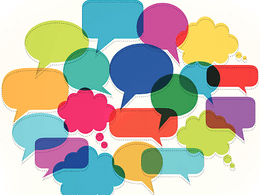TOP FIVE FAQs ABOUT DLD
DLD Awareness Day
'What on earth is DLD, and why does it have an awareness day?' I hear you ask? Well, this is exactly why DLD Awareness Day exists, and why we have created this helpful list of FAQs! DLD Awareness Day is Today 16th October 2020, and in keeping with RADLD.org ‘s #DLDseeme campaign, we wanted to help spread the word about this little-known disorder, which affects so many, by answering five of the top FAQs concerning DLD.
What is DLD?
DLD stands for Developmental Language Disorder. It describes the phenomenon where children’s difficulties understanding and/or using spoken language are not associated with a biomedical condition (e.g. Autism, Intellectual Disability (non-verbal IQ below 70), Cerebral Palsy, Sensorineural hearing loss, Down Syndrome etc.) DLD is a life-long condition that persists beyond secondary school life, impacts significantly on educational progress and social interaction, is known to have a genetic and neurological component and is more common in boys.
Is DLD common?
DLD is probably the most common childhood condition you have never heard of, affecting two children in every classroom (approximately 7% of the population). In the past, it has been referred to as specific language impairment (SLI) however the terminology has now changed. In fact, it is more common than Autism yet so much less known.
What does DLD look like in children and young people?
Students with DLD are likely to have;
- Difficulty understanding language, both words and sentence structure (tenses, word order)
- Difficulty remembering long or complex instructions poor short term/ good long term.
- Slow processing and formulation of ideas
- Difficulty expressing what they want to, even though they have the ideas
- Disordered sentence structure, sound muddled, poor sequencing of ideas
- Difficulty learning vocabulary. Confuse words that are semantically or phonologically similar (pillow/hippo)
- Problems recalling the words they want to say (word retrieval difficulty)
- Easily lose concentration because of the effort required to make sense of language/ instructions
- Difficulties with executive and motor skills
What conditions can DLD co-occur with?
DLD can co-occur with other neurodevelopmental disorders and a diagnosis can still be given by a Speech and Language Therapist (SLT) when these are present. These include difficulties in the areas of;
- Attention (e.g. ADHD)
- Motor (e.g. dyspraxia, dysarthria)
- Literacy (including dyslexia)
- Speech
- Executive function
- Adaptive behaviour
- Behavioural and emotional disorders
- Auditory processing (e.g. APD)
Can DLD be treated?
When provided with high quality support and understanding, an individual with DLD can achieve social, academic and professional success. See what
services and strategies we provide
to help young people with DLD.
Other important facts about DLD
- People with DLD do not look any different to their peers and it may not be immediately obvious
- A person with DLD has difficulties with language, not intelligence
- Although developing language is the primary area of difficulty, DLD can often occur with challenges in other areas of development too (e.g. social skills, learning, vocabulary, understanding etc.).
- Research indicates that adolescents benefit from specialised support to develop their language skills
- Despite the high prevalence, the exact cause of DLD remains unknown. It can run in families and be influenced by genetic factors.
- DLD is a lifelong condition. Even though it might not be recognised, adults can have DLD too.
- Contact us to start planning a bespoke plan for your child/school today!
- For more DLD Resources click here
- Search the #DLDseeme hashtag and join in the fun!
- Join the conversation! Let us know your thoughts in the comments below, we would love to hear from you.
- Why not test your DLD knowledge on the RADLD QUIZ!
Written with contribution from Amy Fraser, Speech and Language Therapist




